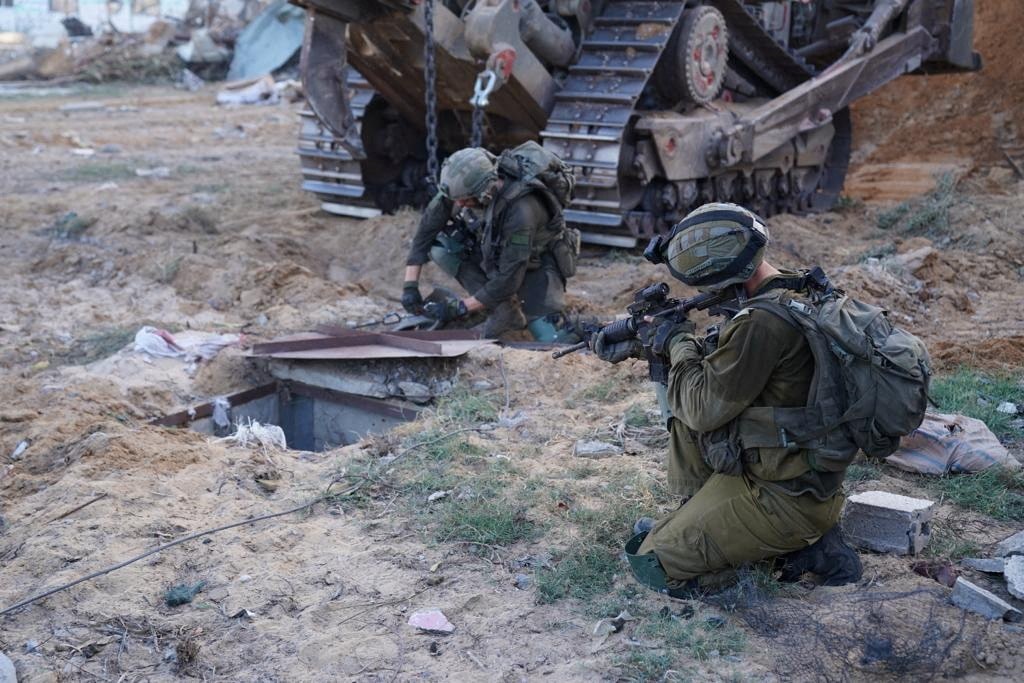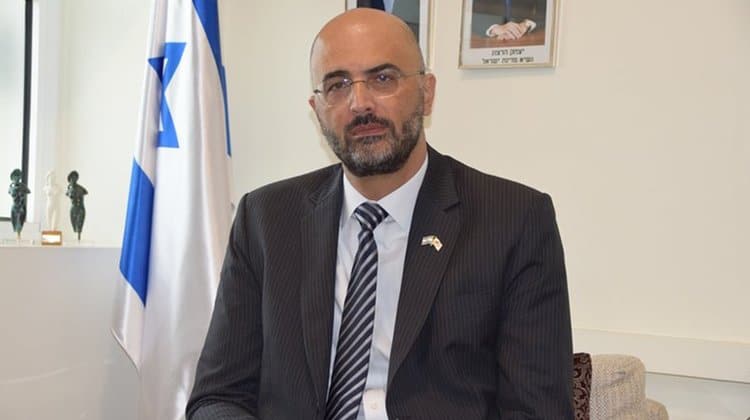Oren Anolik says looking at the Hamas killings and Israel’s response through the prism of the decades-long Israeli-Palestinian conflict is just playing into the hands of terrorists
Which is more inhumane? Facelessly dropping bombs from a great height that flatten buildings killing huge numbers of people including thousands of children, or watching a person pick up a garden hoe and behead another human being up close and personal as they lie already bloodied and helpless on the ground.
The unequivocal answer would be both but so divisive has the Israeli-Palestinian conflict become across the world since Hamas carried out its terror attack on October 7 and Israel retaliated with all its military might, that many, not all, supporters of each side have been slow to acknowledge the brutality perpetrated by the other.
The lines have been drawn. Pick a side and never mind that on the streets of European capitals, some in the anti-fascist far-left have unironically aligned themselves with far-right neo-Nazis using such inexcusable slogans as ‘Gas the Jews’ with complete impunity. On the other side of the coin, Palestinians and other Muslims report increased incidents of Islamophobia from pro-Israel groups.
Blurry lines are everywhere, pro-Palestinian but anti-Hamas, pro-Palestinian and pro-Hamas, anti-Israel, pro-Jewish but anti-Zionist, pro-Zionist, pro-peace, anti-war. There are minorities in each camp that may think the other ‘deserves it’ but the vast majority of right-minded people just want the killing to end, no matter who the perpetrators are.
But If war is ultimately a numbers’ game, then the Israelis, at face value, are clearly seen as the baddies here, especially when rooting out Hamas involves the apparent collective punishment of more than two million people in a very small theatre of operations. The death toll in Gaza has surpassed 11,000 – a figure disputed by Israel – some 40 per cent of whom are children, compared to Israeli civilian losses in the Hamas killings of 1,200 and the taking of 240 hostages.
Israel may have the support – for now – of most Western governments ‘to defend itself’ to use the political terminology, but the mood on the streets belies this and as each day passes and the Palestinian civilian death toll mounts, Tel Aviv will find it increasingly difficult to justify its Gaza operation as self-defence.
A month in, and it is already walking a very fine line between ‘taking out a terrorist group’ and being seen as the perpetrator of a genocide, a term it vehemently rejects, even though it must realise that the current carte blanche from Western governments, under pressure themselves to put a stop to it, could come with an expiry date. Then what?
For Israeli ambassador to Cyprus, Oren Anolik, there is no other alternative to ousting Hamas from Gaza, whatever it takes, even at the risk of a wider conflict involving Iran and whatever worst-case scenarios result from that for the world at large.
“What happens to us if we lay down arms? Basically, we’d be massacred, butchered or we will be thrown into the sea or out of Israel,” Anolik said, making it clear he was not referring to all Arab nations or all Muslims. “But there is a large, quite a large portion among our neighbours, around 25 per cent… their goal and their ideology is ‘no Israel, from the river to the sea, Palestine will be free’. If we cannot fight for our defence, they will butcher us.”
Israel’s second goal is of course freeing the hostages. “We have 240 hostages held by Hamas, 33 of them children under the age of 18. Among them 10 are under the age of 5, 18 other people over the age of 75, people with disabilities, sick people. They took whoever they could take with them, put them in the tunnels and we don’t have any information about that.”

Israeli soldiers inspect the entrance to what they say is a tunnel used by militants of the Palestinian Islamist group Hamas, during a ground operation in a location given as Gaza, in this handout image released November 9, 2023. Israel Defense Forces/Handout via REUTERS THIS IMAGE HAS BEEN SUPPLIED BY A THIRD PARTY
Anolik says Israel is able to withstand the criticisms stemming from the fact that the world sees them as the stronger force. “But in what sense [are we stronger]?” he added. “Compared with just the Palestinians, maybe yes but we are living inside an Arab and Muslim world around us with hundreds of millions, most of whom still hate us. The feeling we have is there is almost no sympathy for us, even now after October 7.”
Perhaps this is because pro-Palestinian supporters see the massacres at the Be’eri kibbutz and the Nova music festival, and the kidnappings of hostages as not having occurred in a vacuum but in the context of a well-known decades-long history of failed negotiations, extreme violence from both sides, and a myriad of justifications that this space cannot possibly accommodate.
Anolik, however, representing his government, says Israel views what is happening now as not falling within the context of the Israeli-Palestinian conflict. “Hamas didn’t do this to bring an end to the occupation. They don’t care. They did it because their ideology is ‘no Israel’. The effort to look right now at what is going on through the prism of the Israeli-Palestinian conflict is playing into the hands of the terrorists,” he said.
“We realise that living next door to a caliphate, to a jihadist regime that is talking openly about its wish to eliminate us and destroy us is not just words that are being said. They have a real plan to execute it. And once given the chance, this is what they’re doing. So we are at war. We are at war that was forced upon us.”
The ambassador said this was not just “another operation, another round” or “what others like to call another cycle of violence”. Israel is using military means because it believes there is no other way to take out Hamas.
“The way we see it is that this must be the last word against Hamas. There’s no point in doing what’s being done now, quitting in the middle and having to go back and fight again so we need to finish this.”
Asked how many civilian deaths it might take to achieve this goal, Anolik takes us to task saying killing people is not the goal either militarily or by means of the growing humanitarian crisis in Gaza. He said Israel was operating within international law, which includes acceptable civilian collateral damage in warfare and is under no international obligation “to supply our enemies”.
“The EU and the UN brought in all those pipes for water. They [Hamas] dug them out and used them for rockets,” he said. The ambassador also said Hamas was using its stored fuel, not to supply the population, not to make sure they have water, but for the tunnels “because for Hamas, trying to kill Israelis is much more important than taking care of its own population”.
“The war can be finished tomorrow… today in five minutes. All Hamas needs to do is surrender. All Hamas needs to do is see the damage being done to Gaza, to see how many people are suffering, to see that Israel has a really strong war machine and ‘I know I cannot beat them. I’ll lay down my arms and it’s finished’. But they don’t want to do this because for them, the fate of their own people is an asset. Dead Palestinians are an asset to Hamas,” he said.
“We are being blamed sometimes for genocide, ethnic cleansing all those big words. If we want to just eliminate Palestinians with our military might, we’re going to see hundreds of thousands of people dead in Gaza.”
A ceasefire or the creation of safe zones in Gaza are out of the question for Israel. Anolik said a ceasefire would be a lose-lose situation both for Israel and the future of the people of Gaza. Safe zones would be a magnet for Hamas fighters, endangering even more civilians, and a ceasefire would “be a Hamas victory”.
Amid the fog of war, the propaganda from both sides and their respective justifications, the fear of annihilation on the part of Israelis appears genuine. Anolik hints at an inevitable escalation “not now but not in a very far future” if and when Iran-backed Hezbollah joins the fight from Lebanon. Israel has already evacuated 110,000 people from their homes near the Lebanese border.
“My own assumptions… not knowledge… we understand what is going to happen,” he said, adding that Iran is much too big of an enemy for Israel to take on alone, and there is the added unknown of Russia backing Tehran.
“We need the international community and also the Europeans on this. Iran is a multi-faceted, multi-layered, strategic threat to the world, not just Israel,” Anolik added.
He said Hamas was also a tool of Iran but Tehran was more than willing to let Palestinians die on its behalf. “They love to let Sunni Arabs die for them because they despise them anyway.”
“We do not want to see a second front. We want to focus on Gaza. We want to finish the job there,” Anolik said, adding that while Israel is responding to skirmishes with Hezbollah, it will not take the initiative there.
“We want to contain this. I hope that this will be successful because if this is not successful and Hezbollah makes the mistake of joining this war we are going to attack in ways that are going to be very painful,” he added.
An escalation would also be bad for Cyprus, the ambassador said. “You will see hundreds of thousands of people fleeing Lebanon, and also probably from Israel, and Cyprus will be the first stop on the way out.”
As for the antisemitism that has resurfaced in a number of Western countries, Anolik said there hadn’t been large numbers of reports in Cyprus by comparison. “But there is tension. You can sense the tension here,” he said, referring to fears of a terrorist attack.
“You can feel it among the Israeli community. There is a border with Turkey. People can easily come from anywhere into Turkey and from there to the occupied territory and then to here so it makes people feel a bit exposed.” he said.
“On October 7, after this massacre, there was celebration not just in Gaza. These people [Pro-Palestinians supporters] didn’t live even one day of their life under occupation or were in any way persecuted. Why? What is there to celebrate exactly?”
Good question.
The views presented are those of the Israeli ambassador. Read the interview with the Palestinian Ambassador to Cyprus here.







Click here to change your cookie preferences